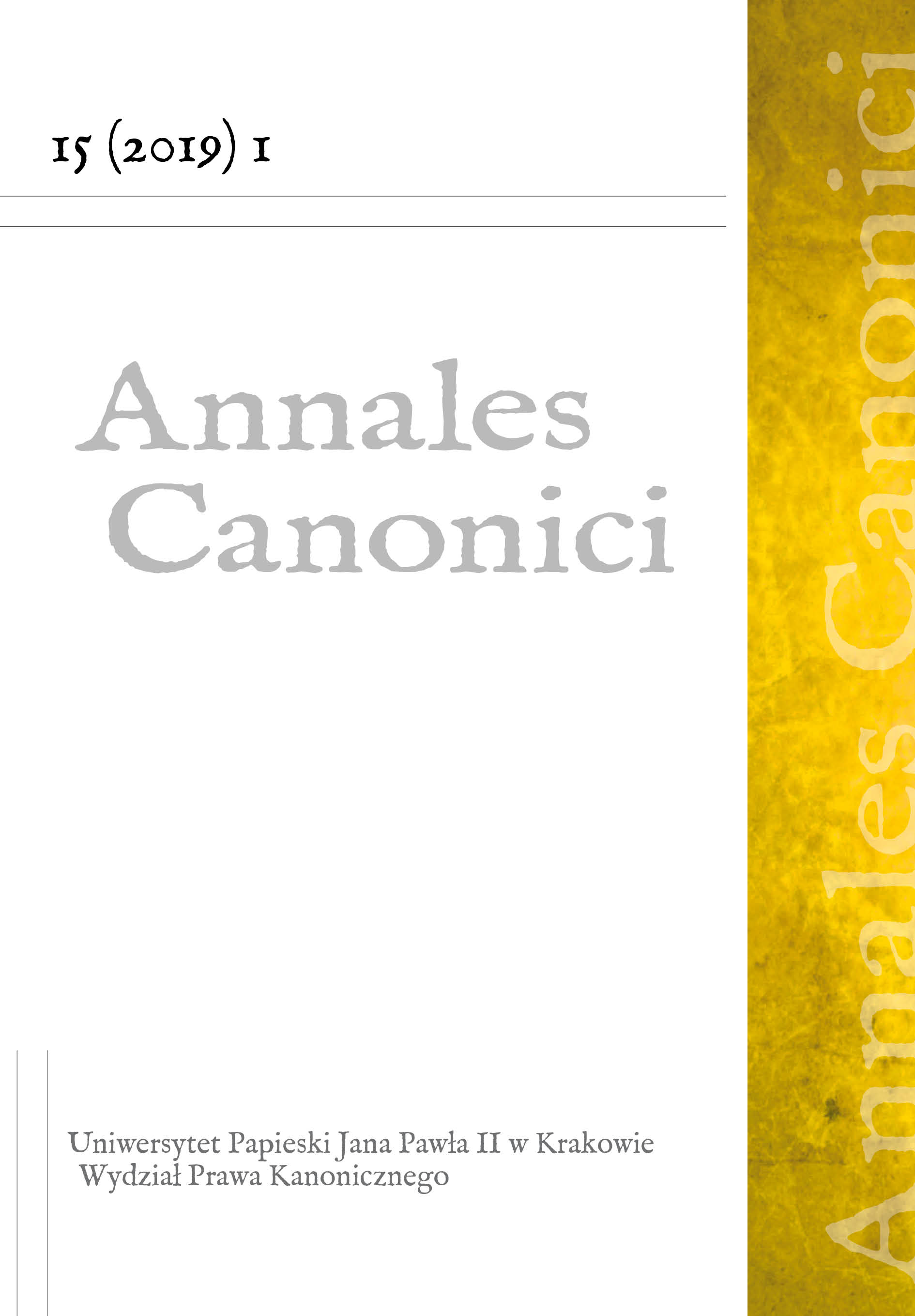Teologiczne podstawy Dekretu ogólnego KEP z dnia 13 marca 2018 roku w sprawie ochrony osób fizycznych
DOI:
https://doi.org/10.15633/acan.3397Słowa kluczowe:
ochrona danych osobowych, godność człowieka, wolność Kościoła, prawo do prywatnościAbstrakt
Zasadność faktyczna i prawnodoktrynalna skonstruowania normy prawnej są problemem istotnym w każdym porządku prawnym. Tym bardziej ważne staje się ich ustalenie, gdy należą do wewnętrznej rzeczywistości Kościoła. Obecnie w prawie świeckim regulacje dotyczące ochrony danych osobowych stały się zagadnieniem wymagającym uwagi różnych podmiotów, także związków wyznaniowych. Kościół katolicki w Polsce, odpowiadając na tę sytuację i na bieżące potrzeby wiernych, wydał w 2018 roku Dekret regulujący ochronę danych osobowych w Kościele. Dekret ten stanowi część systemu prawa kanonicznego.
Prawo kanoniczne jest silnie związane z teologią. Reguluje ono bowiem życie wiernych, które w każdym obszarze jest ważną manifestacją zasad wiary. Teologiczny wymiar podstaw Dekretu widać wyraźnie w tym m.in, że: 1) prawodawca jest jednocześnie nauczycielem wiary, 2) przedmiotem troski prawodawcy jest godność człowieka, 3) Dekret dba o wolność i niezależność Kościoła, 4) Dekret chroni prawo do prywatności.
Tym samym Dekret ma solidne podstawy i cele teologiczne, które trzeba wydobyć i na nich oprzeć jego wykładnię. Jest to konieczne z tego względu, że redakcja Dekretu jest wadliwa i budzi poważne zastrzeżenia kanonistów. W konsekwencji powoduje to zagrożenie dla wyników aplikacji norm z niego wypływających. Poznanie teologicznych podstaw może pomóc w tym, aby ustawa, o której mowa, przyczyniała się do salus animarum.
Bibliografia
Pismo Święte Starego i Nowego Testamentu, w przekładzie z języków oryginalnych (Biblia Tysiąclecia), Poznań 2000.
Boillat P., Kjaerum M., Handbook on European data protection law, Luxemburg 2014.
Dekret Ogólny Konferencji Episkopatu Polski w sprawie wystąpień z Kościoła oraz powrotu do wspólnoty Kościoła z dnia 7 października 2015 r., Akta Konferencji Episkopatu Polski nr 27/2005, s. 101–104.
Dekret ogólny w sprawie ochrony osób fizycznych w związku z przetwarzaniem danych osobowych w Kościele katolickim wydany przez Konferencję Episkopatu Polski, w dniu 13 marca 2018 r., podczas 378. Zebrania Plenarnego w Warszawie, na podstawie kan. 455 Kodeksu Prawa Kanonicznego, w związku z art. 18 Statutu KEP, po uzyskaniu specjalnego zezwolenia Stolicy Apostolskiej z dnia 3 czerwca 2017 r.
Dyrektywa 95/46/WE Parlamentu Europejskiego i Rady Unii Europejskiej z dnia 24 października 1995 r. w sprawie ochrony osób fizycznych w zakresie przetwarzania danych osobowych oraz swobodnego przepływu tych danych (Dz. Urz. UE L Nr 281 z 23 listopada 1995 r., s. 31n).
Gręźlikowski J., Realizacja prawa do dobrego imienia i ochrony własnej intymności w Kościele (kan. 220 KPK) w świetle ustawy i instrukcji o ochronie danych osobowych, „Teologia i Człowiek” 19 (2012), s. 229–255.
Instrukcja Generalnego Inspektora Ochrony Danych Osobowych oraz Sekretariat Konferencji Episkopatu Polski z dnia 23 września 2009 r., Ochrona danych osobowych w działalności Kościoła katolickiego w Polsce; https://giodo.gov.pl/data/filemanager_pl/wsp_krajowa/KEP.pdf (17.09.2018).
Jan Paweł II, Gaudium et spes. Constitutio Pastoralis de Ecclesia in Mundi Huius Temporis, „Acta Apostolicae Sedis” 58 (1966), s. 1025–1120.
Jan Paweł II, Motu proprio La cura vigilantissima z dnia 21 marca 2005 r., „Acta Apostolicae Sedis” 97 (2005), s. 353–376.
Jan Paweł II, Redemptor hominis, „Acta Apostolicae Sedis” 71 (1979), s. 257–324.
Katechizm Kościoła Katolickiego, wydanie 2. poprawione, Poznań 2002.
Kodeks kanonów Kościołów wschodnich (Codex Canonum Ecclesiarum Orientalium auctoritate Ioannis Pauli PP. II promulgatus, 18.10.1990), „Acta Apostolicae Sedis” 82 (1990) n. 11, s. 1061–1147.
Kodeks prawa kanonicznego (Codex Iuris Canonici auctoritate Ioannis Pauli PP. II promulgatus, 25.01.1983), „Acta Apostolicae Sedis” 75 (1983), pars II, s. 1–301; tekst łacińsko-polski: Kodeks prawa kanonicznego, przekład zatwierdzony przez Konferencję Episkopatu Polski, Poznań 1984.
Majer P., Ochrona prywatności w kanonicznym porządku prawnym, w: Ochrona danych osobowych i prawo do prywatności w Kościele, red. P. Majer, Kraków 2002, s. 83–123.
Przepisy Konferencji Episkopatu Polski o prowadzeniu ksiąg parafialnych: ochrzczonych, bierzmowanych, małżeństw i zmarłych, oraz księgi stanu dusz z dnia 26 października 1947 r.
Rozporządzenie Parlamentu Europejskiego i Rady (UE) 2016/679 z dnia 27 kwietnia 2016 r. w sprawie ochrony osób fizycznych w związku z przetwarzaniem danych osobowych i w sprawie swobodnego przepływu takich danych oraz uchylenia dyrektywy 95/46/WE (ogólne rozporządzenie o ochronie danych) (Dz. Urz. UE L. z 2016 r. Nr 119, str. 1 z późn. zm.).
Sobański R., Normatywność godności człowieka, w: Godność człowieka a prawa ekonomiczne i socjalne. Księga jubileuszowa wydana w piętnastą rocznicę ustanowienia Rzecznika Praw Obywatelskich, Warszawa 2003, s. 19–35.
Sobański R., Prawo w prawie: prawo Boże i prawo ludzkie, „Teologia Polityczna” 2004–2005 nr 2, s. 267–273.
Sobański R., Zarys teologii prawa kanonicznego, Warszawa 1973.
Sohm R., Das Kirchenrecht. Erster Band, Diegeschichtlichen Grundlagen, Leipzig 1892, przedruk z 1923 r.; https://archive.org/details/RudolfSohmKirchenrechtBd1/page/n1 (19.09.2018).
Ustawa z dnia 29 sierpnia 1997 r. o ochronie danych osobowych (t.j. Dz. U. z 2016 r. poz. 922 z późn. zm.).
Pobrania
Opublikowane
Numer
Dział
Licencja
Prawa autorskie (c) 2019 Małgorzata Chojara-Sobiecka

Utwór dostępny jest na licencji Creative Commons Uznanie autorstwa 4.0 Międzynarodowe.
Autorzy publikujący w czasopiśmie udzielają jego wydawcy zgody o następującej treści:
- Autor zachowuje autorskie prawa majątkowe do utworu, a jednocześnie udziela wydawcy czasopisma zgody na jego pierwszą publikację w wersji drukowanej i wersji online na licencji Creative Commons Uznanie autorstwa 4.0 Międzynarodowe oraz zgody na wykonywanie opracowań, w tym przekładów.
- Autor ma możliwość udzielania zgody niewyłącznej na opublikowanie utworu w wersji, która ukazała się w czasopiśmie (np. zamieszczenia go w repozytorium instytucjonalnym lub opublikowania w książce), wraz z informacją o jego pierwszej publikacji w czasopiśmie.
- Autor może umieścić swój utwór online (np. w repozytorium instytucjonalnym lub na swojej stronie internetowej) jeszcze przed zgłoszeniem utworu do czasopisma.

